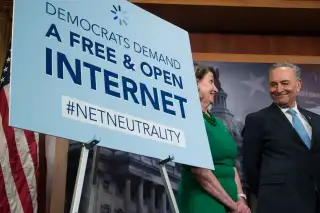Net Neutrality Is Officially Dead. Here's How the Changes Could Affect You, According to Experts

As of Monday morning, net neutrality no longer exists. But what is net neutrality, and what does its repeal mean for you?
Net neutrality is a way to ensure that internet service providers (ISPs) treat all online data equally — and former President Barack Obama's administration enacted a law that protected it in 2015. The rules were meant to protect consumers by mandating that ISPs like AT&T, Verizon and Comcast couldn't throttle your internet speeds to make certain content play slower, create internet fast lanes for customers who paid more for content or block certain websites and apps.
"Net neutrality ensures equal access to online content regardless of who is providing or requesting information," Florian Schaub, an assistant professor at the University of Michigan who specializes in internet privacy, wrote in a paper recently published in the academic journal Media and Communication.
Net neutrality was repealed last year under an order called the "Restoring Internet Freedom" order. Last month, the Senate passed a last-ditch effort to overturn the FCC's repeal, but it never progressed to a House vote and was officially repealed Monday.
Why was net neutrality repealed?
The debate around net neutrality was immediately politicized. Supporters argued that without net neutrality, Americans would lose access to a free and open internet, while those who were against the policy said it stifled innovation in the telecommunications industry. After control of the the Federal Communications Commission (FCC) changed hands following the 2016 election, the agency's new chairman, Ajit Pai, started dismantling net neutrality regulations, arguing they were overly restrictive.
And while net neutrality is polarizing, it is an example of a regulation that both companies and consumers agree on. Even some technology companies joined the fight to preserve net neutrality, including Mozilla and Vimeo. Meanwhile, at least 29 states have pending legislation that would require ISPs to uphold net neutrality rules, according to the National Conference of State Legislatures. In Montana and New York, governors signed executive orders that uphold the Obama-era net neutrality regulations.
How could the net neutrality repeal affect you?
There are two main schools of thought as to how the end of net neutrality will affect everyday internet users.
Supporters of net neutrality are concerned that without it, we could lose access to a free and open internet. One specific fear is that smaller companies and startups will not have the same opportunities to grow if ISPs can pick and choose companies and services to favor in what is called "paid prioritization." Say, for example, Time Warner, which is already an investor an Hulu, strikes a deal for streaming services — meaning Hulu pays Time Warner a fee to prioritize its content over others. Time Warner could "block" or "throttle" Netflix if it declined to pay Time Warner a fee, slowing it down for users while Hulu runs at full speed in a "fast lane." Such a scenario could be particularly devastating for startups with ambitions of becoming the next Netflix or Hulu, as they will have a much harder time paying ISP fees to compete early on.
That may sound annoying for Netflix users, but it's easy to imagine farther-reaching consequences given the ubiquity of the internet, which now functions more like electricity than an information service. Nine in 10 American households use the internet, according to Pew Research Center, for everything from researching recipes, communicating with friends and family by marking themselves "safe" on Facebook or Googling symptoms of a medical issue to see whether a trip to the emergency room is needed. The longer-term ramifications of a world without net neutrality is what concerns proponents of a fair and open internet — issues like a threat to free flow of information and a hazard to speech rights. For example, net neutrality ensured that an ordinary citizen's blog about local politics would not be slowed down or delayed from users in favor of paid advertisements or companies that pay a prioritization fee.
Not everyone is worried about net neutrality being repealed, of course. Some say that consumers may not notice any changes at all.
"The idea that your ISP, because it controls the on-ramp to the internet, can be in a position to affect the flow of information in society is a concern that resonates with people," Daniel Lyons, a telecommunications lawyer, tells Money. But, "it's much easier to reduce this issue to a Twitter slogan than it is to really get behind the detail and figure out what reasonable network management practices are," he said.
Lyons said he thinks the likelihood of actual harm from net neutrality is relatively remote, and that laws that already exist to regulate corporations, like anti-trust regulations, will prevent ISPs from behaving badly.
Others, like Schaub, disagree. "They now have almost free reign over what content their subscribers will have access to," he wrote. If companies like Comcast and AT&T can charge more for "internet packages" the same way they charge different prices for cable TV packages, Schaub said people who are already struggling to pay their bills may suffer.
"ISPs could curate what online content and services most people will have access to, and which ones will only be available to those who are willing to and can afford to pay extra," Schaub added. "You want access to the whole Internet? Sure, that’s still available – just sign up for the premium package."
The reality is that what no one knows exactly what the internet will look like moving forward without net neutrality in place. But like many ardent net neutrality supporters, Schaub said he thinks it will take a while for the repeal to trickle down to customers, saying it will be more like "small and creeping changes rather than sudden shifts."